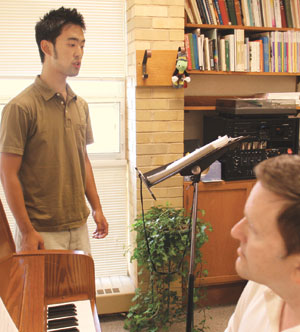 Earlier this year I had a student wind ensemble sight-read a piece called Stille Nacht that required the instrumentalists to sing a slightly altered version of the melody of that famous Christmas carol. Although the tune was familiar to the band members, most had difficulty matching the pitches even after the first rehearsal. I was astounded. At that moment I understood why the band could not play in tune, why their phrasing was awkward, and why the brass players had trouble hitting high notes.
Earlier this year I had a student wind ensemble sight-read a piece called Stille Nacht that required the instrumentalists to sing a slightly altered version of the melody of that famous Christmas carol. Although the tune was familiar to the band members, most had difficulty matching the pitches even after the first rehearsal. I was astounded. At that moment I understood why the band could not play in tune, why their phrasing was awkward, and why the brass players had trouble hitting high notes.
The incident brought back memories of my father, who years earlier had nearly forced me to study voice during graduate school. I had told him that I already had enough going on in my life and had no desire to sing. I was a trombonist, a composer, and a conductor.
My father, however, persuasively pointed out that Emory Remington, the former trombone professor at the Eastman School of Music, would sing during his students’ lessons. After considering everything that Remington’s students have achieved, I took my father’s advice and began studying voice with Ron Freeman, a former member of the United States Army Chorus.
I have never regretted that decision. After a few lessons I realized that I enjoyed singing and that studying voice helped improve my skills on the trombone.
Breathing
The first thing I noticed during voice lessons is how much air is necessary to sing well. Although I had been playing the trombone for years, I had somehow managed to develop a bad breathing habit that caused my trombone playing to suffer. Once my voice instructor noticed this, I began to practice breathing deeply, and my sound on the trombone improved noticeably.
Legato and Cantabile Playing
I am not the only wind player to develop bad breathing habits. Young wind players, for example, often do not understand that they should keep the air going until a phrase is complete. Some even stop the air in between every note because playing in a legato or cantabile style is a foreign concept to them.
If you ask these students to sing the same melody, they may take breaths at the wrong moment, but they will not stop the air between every note. It would be just as unnatural and jarring as it would be to stop the air between every word of a sentence. Asking students to sing a melody will help them realize the importance of keeping the air moving when they play an instrument.
Intonation
Before studying voice, I thought I had a good sense of intonation, but my voice instructor soon cured that delusion. One minute my voice was sharp, the next minute it was flat. In time my aural skills sharpened to the point that I even noticed moments of poor intonation on radio stations that played popular music. In addition, I made more adjustments when playing trombone than I had ever done before. My ears were sharper, and my new breathing habits helped me maintain a steady pitch. Singing was making me a better trombonist.
Inner Ear, Sightreading,
And the High Register
I was lost the first few times my voice instructor asked me to sing a piece of music at first sight. I had practiced playing intervals on the trombone enough to be able to hear them in my inner ear, but I simply could not determine the intervals quickly enough to sing them in tempo.
As it was with the other skills, my sight-singing improved remarkably after a few months of practice, and I became a more capable, confident sight-reader on the trombone. I knew how the pitches sounded in relation to one another before ever picking up my instrument. That ability allowed me to focus more on counting the rhythms in the music correctly.
In addition, my improved inner ear helped my ability to play high notes. Before studying voice I always relied on how it felt to play certain notes, and as a result I cracked more high notes than I care to admit. As the partials on brass instruments get closer and closer together different notes begin to feel virtually the same to play. Therefore, if a brass player cannot hear a high note before he attempts to play it, there is a strong possibility that he will overshoot it and crack the note. Once I could hear the note before I played it, my high register improved dramatically.
Even percussionists can benefit from improved listening skills through vocal study. Tuning timpani requires exceptional aural skills. Furthermore, singing can help percussionists better understand the difficult task of playing legato on mallet instruments.
Confidence as a Performer
Studying voice advanced my abilities in many ways. As a trombonist my breathing, tone, intonation, sight-reading, and high register all improved noticeably, helping me become a more confident musician.
With my reformed breathing habits, my sound has become more sonorous and less shaky, and because I can now hear notes before playing them, I am more certain not to crack or miss high notes. Overall, I have become a more confident sight-reader, and my ears are now sensitive enough to adjust my tuning as needed.
Most of these skills have also proved valuable to me as a conductor and a composer. For example, to demonstrate how a certain passage should sound, I can now confidently sing that part to the ensemble. In addition, I am better able to correct intonation problems. Finally, because vocal study has improved my inner ear, I depend less on the piano and MIDI playback software when I compose.
I have been silent regarding these benefits for too long and now confidently proclaim the gospel of voice study. It is my hope that other band and orchestra directors will follow my example.






